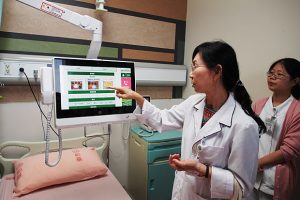Royal Philips, a global leader in health technology, has unveiled key findings from its Future Health Index (FHI) 2023 report in Singapore, titled “Taking Healthcare Everywhere.” The report indicates that Singapore’s health sector is at the forefront of digital technology adoption, addressing healthcare workforce challenges and enhancing healthcare delivery across various settings, from hospitals to homes and communities.
The report highlights that Singapore has been making substantial progress in healthcare digitalization, with continued investment in digital transformation deemed essential for addressing health challenges and supporting the nation’s Healthier SG strategy. The focus is on shifting healthcare beyond hospital walls to enable coordinated, effective, and inclusive preventive care for all.
One significant aspect covered in the report is Singapore’s proactive approach to tackling healthcare workforce shortages. With an estimated need for 24,000 additional allied health professionals and support care staff by 2030, 75% of healthcare leaders in Singapore are already using or planning to use digital health technology to mitigate the impact of workforce shortages. Cloud-based technology for information access (53%), technology solutions connecting with out-of-hospital settings (40%), and workflow technology such as digital health records (33%) are identified as key technologies to alleviate staff shortages.
Furthermore, embracing digital technologies and transformation is associated with attracting healthcare talent. Younger healthcare professionals prioritize working in facilities at the forefront of AI (39%) when choosing where to work, emphasizing the importance of technology adoption for talent acquisition.
The report also sheds light on the impact of virtual care technologies, with 49% of respondents acknowledging virtual care’s significant impact on improving patient care. While 51% of healthcare leaders are currently investing in virtual care, the focus on these investments is expected to decrease over the next three years, reflecting a shift in resource allocation.
Singapore’s healthcare sector recognizes the potential of AI, with 84% of healthcare leaders planning to invest in AI technologies over the next three years. The report outlines how AI will play a pivotal role in predicting outcomes (45%) and providing clinical decision support (40%).
In terms of sustainability, 61% of respondents believe that new care delivery models will contribute to more environmentally friendly and sustainable healthcare. However, healthcare leaders cite challenges in implementing sustainability initiatives, with access to appropriate technology (34%) being a primary barrier.
Overall, the report reflects Singapore’s commitment to digital health advancements, workforce strategies, and sustainability initiatives, positioning the nation as a leader in healthcare innovation and transformation.






















